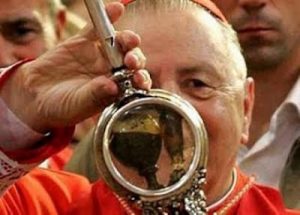WEEKDAY HOMILY 25 01 – Year II
Living as Blessed – Who You are Meant to Be:
Optional Memorial of St. Januarius
(Prov 3:27-34; Ps 15; Lk 8:16-18)
***************************************************
When he turned fifty, folk-music legend Bob Dylan was asked by Rolling Stone magazine if he was happy. He replied, “These are Yuppie words, happiness and unhappiness; its either blessed or unblessed. As the Bible says, ‘Blessed is the man who walketh not in the counsel of the ungodly.’ Now that must be a happy man. Knowing you are the person you were put on this Earth to be – that’s much more important than just being happy. Anyway, happiness is just a balloon – it’s just temporary stuff.”
Dylan’s comments are very much in line with the Book of Proverbs and the gospel for today and their message to us – pray for humble faith to bless and be blessed, to let our light shine, to love and be loved.
The Book of Proverbs is wonderful collection of sayings about how to acquire wisdom. It’s about knowing how to be the person you were put on this Earth to be. And the person we are meant to be is a righteous person who knows he or she has been blessed by God, and who can bless others.
The word “blessing” comes from the Latin “bene-dicere” which means to speak well of. A blessing is important because it establishes our dignity, gives us identity, and provides us with security.
To be blessed is another way of saying we are loved by God. God “blessed” Jesus at his baptism in the Jordan and at the transfiguration: “This is my beloved Son – listen to him.” The Father loved and blessed us when he sent Jesus to live and die for us and poured out upon us his blessing, especially the Holy Spirit – the ultimate blessing from God.
The opposite of a blessing – to be cursed, is not about swearing. It is about withholding a compliment – the love people need. We hurt others more by our words or withheld compliments than by bullets or knives.
In the readings today, to be blessed is to be righteous. It is to do good now. It is to forgive, and to accept without envy. It is to be humble, yet to let our light shine and to be a light to the world. It is to use our gifts to serve others, or we will lose them. In the end, these are all qualities of a disciple, someone who is actively living in the reign of God and building up that reign.
Marianne Williamson, in A Return to Love: Reflections on the Principles of a Course in Miracles comments on letting our light shine: “Our deepest fear is not that we are inadequate. Our deepest fear is that we are powerful beyond measure. You are a child of God. Your playing small does not serve the world. There is nothing enlightened about shrinking so that other people won’t feel insecure around you. We are all meant to shine, as children do. We were born to make manifest the glory of God that is within us. It’s not just in some of us; it’s in everyone. And as we let our own light shine, we unconsciously give other people permission to do the same. As we are liberated from our own fear, our presence automatically liberates others.”
 Today the church honors St. Januarius. Little is known about his life or martyrdom. His fame is centred on a relic, said to contain his blood, that is kept in the cathedral at Naples. Early devotion to the saint was based on the belief that Januarius, an Italian bishop, lived in the 4th century and was martyred during the Diocletian persecution, but the records are unreliable. Since the 5th century, the flask containing the blood has attracted attention. Eighteen times a year, the solid mass in the vial becomes liquefied, sometimes seeming to bubble and froth. The relic is an object of devotion and the activity is said to be miraculous. No natural explanation has been found for this phenomenon.
Today the church honors St. Januarius. Little is known about his life or martyrdom. His fame is centred on a relic, said to contain his blood, that is kept in the cathedral at Naples. Early devotion to the saint was based on the belief that Januarius, an Italian bishop, lived in the 4th century and was martyred during the Diocletian persecution, but the records are unreliable. Since the 5th century, the flask containing the blood has attracted attention. Eighteen times a year, the solid mass in the vial becomes liquefied, sometimes seeming to bubble and froth. The relic is an object of devotion and the activity is said to be miraculous. No natural explanation has been found for this phenomenon.
The Eucharist is itself a blessing from God. Not only are bread and wine blessed, transformed into the Body and Blood of Christ and shared among us, but we are also blessed, spoken well of, and like Jean, sent out into the world to let our light shine and to be a blessing to others.
In closing, here are some thoughts by William Butler Yeats:
My fiftieth year come and gone.
I sit, a solitary man,
In a crowded London shop,
An open book and empty cup
On a marble table-top.
While on the shop and street I gazed
My body of a sudden blazed;
And twenty minutes more or less
It seemed so great my happiness
That I was blessed and could bless.
(Vacillation, Verse IV)



